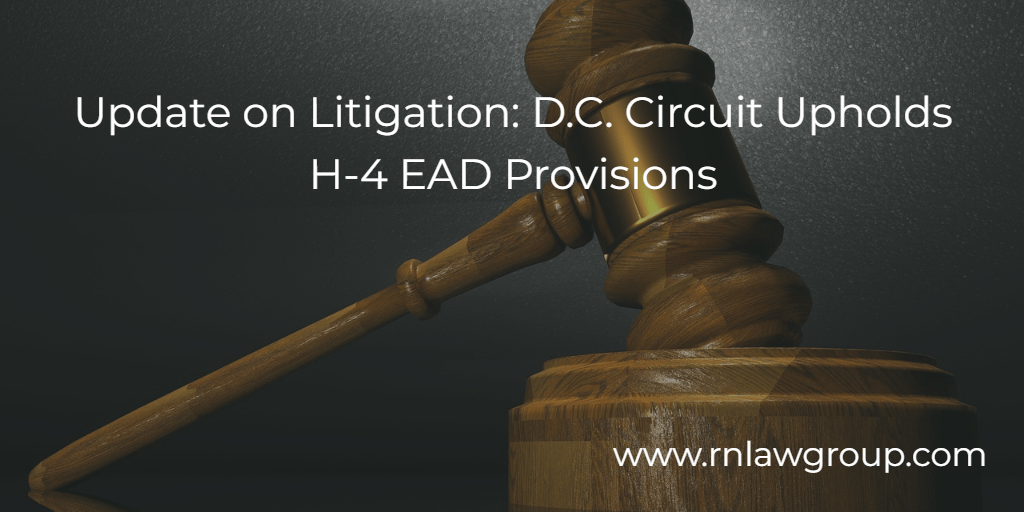
Update on Litigation: D.C. Circuit Upholds H-4 EAD Provisions
The ongoing legal battle over the H-4 Employment Authorization Document (EAD) program, which grants work authorization to certain spouses of H-1B visa holders, has reached a critical juncture. Save Jobs USA, a group the purports to represent American tech workers, has long challenged the legality of this program, arguing that it harms U.S. workers by increasing job competition. The case, Save Jobs USA v. DHS, recently culminated in a significant ruling by the D.C. Circuit Court of Appeals, which upheld the H-4 EAD provisions, solidifying their place in U.S. immigration policy.
Background on H-4 EAD
The H-4 visa is a non-immigrant visa issued to immediate family members (spouse and children under 21) of H-1B visa holders, who are typically highly skilled foreign workers employed in specialized occupations in the United States. Before the introduction of the H-4 Employment Authorization Document (EAD), H-4 visa holders had limited opportunities to work in the U.S., which created financial and social pressures for many families.
In 2015, the Department of Homeland Security (DHS) introduced a regulation allowing certain H-4 visa holders to apply for work authorization. This provision aimed to alleviate the burdens faced by H-4 visa holders by allowing them to contribute to the workforce, thereby supporting the economic stability of their families and enhancing their integration into American society. The rule was specifically targeted at H-4 visa holders whose spouses were in the process of seeking permanent residency (green cards) under the Employment-Based Green Card Program, as these individuals often faced lengthy wait times due to visa backlogs.
The Legal Challenge: Save Jobs USA v. DHS
The H-4 EAD regulation faced legal challenges from a group called Save Jobs USA, an organization that claims it represents American tech workers, arguing that the rule would unfairly increase job competition for U.S. workers. The group claimed that the DHS lacked the statutory authority to grant work authorization to H-4 visa holders and that the rule was arbitrary and capricious.
The case, Save Jobs USA v. DHS, began in 2015, shortly after the rule was implemented. The plaintiffs sought to invalidate the H-4 EAD rule, contending that it would cause irreparable harm to American workers by increasing competition in the job market. The case was initially dismissed by the U.S. District Court for the District of Columbia in 2016, which ruled that Save Jobs USA lacked standing to challenge the regulation. However, the case was revived by the D.C. Circuit Court of Appeals in 2019, which concluded that the group had standing to sue based on the potential competitive harm to its members.
Recent Developments and D.C. Circuit’s Decision
The legal battle over the H-4 EAD rule has been ongoing for nearly a decade, with various rulings and appeals. In March 2023, U.S. District Judge Tanya S. Chutkan granted summary judgment in favor of DHS, affirming that the agency had the statutory authority to issue the H-4 EAD rule. The court found that the plaintiffs had not demonstrated that the rule was arbitrary or capricious. While many in the immigrant community were concerned that the recent overturning of Chevron Deference would negatively impact this case, Judge Chutkan only cited to Chevron once, in a footnote, explaining that it does not apply because the INA is abundantly clear on DHS’ authority to govern work authorization.
Following this decision, Save Jobs USA appealed to the D.C. Circuit Court of Appeals, seeking to overturn the lower court’s ruling. In August 2024, the D.C. Circuit upheld the district court’s decision, reaffirming DHS’s authority to issue the H-4 EAD rule. The appellate court reasoned that its earlier decision in Washington Alliance of Technology Workers v. DHS (WashTech), which dealt with similar issues related to DHS’s statutory authority to regulate OPT and STEM OPT, was binding precedent. The court found that Save Jobs USA had failed to distinguish its case from WashTech meaningfully and had not provided sufficient grounds to challenge the H-4 EAD rule.
The D.C. Circuit’s decision represents a significant victory for the thousands of H-4 visa holders who have relied on the EAD program to work legally in the United States. The ruling also underscores the judiciary’s deference to DHS’s interpretation of its statutory authority under the Immigration and Nationality Act (INA), particularly in areas related to employment authorization for non-citizens.
Implications of the Ruling
The D.C. Circuit’s decision to uphold the H-4 EAD rule has several important implications for H-4 visa holders, employers, and the broader U.S. labor market:
- Continued Work Authorization for H-4 Visa Holders: The ruling ensures that H-4 visa holders who qualify under the DHS rule can continue to obtain work authorization, providing them with economic independence and the ability to contribute to their families’ financial well-being. This is especially important for families facing long waits for employment-based green cards.
- Impact on U.S. Labor Market: While the plaintiffs argued that the H-4 EAD rule would harm U.S. workers by increasing competition, the court’s decision suggests that the economic benefits of allowing H-4 visa holders to work outweigh potential drawbacks. Many employers have welcomed the H-4 EAD program, as it allows them to tap into a pool of highly educated and skilled workers who might otherwise be unable to work legally in the U.S.
- Judicial Deference to Agency Authority: The decision reaffirms the principle that courts will generally defer to federal agencies’ interpretation of their statutory authority, particularly in complex and technical areas like immigration law. This deference is especially important given the evolving nature of immigration policy and the need for agencies like DHS to adapt to changing circumstances.
- Future Legal Challenges: Although the D.C. Circuit’s decision is a significant victory for the H-4 EAD program, it is possible that opponents of the rule may continue to seek ways to challenge it, either through further litigation or by lobbying for legislative changes. Notably, the previous Trump Administration sought to repeal the H-4 EAD regulation but was unsuccessful in doing so. Additionally, Save Jobs can petition for review by the US Supreme Court and likely seek SCOTUS review.
- Legislative and Policy Considerations: The litigation surrounding the H-4 EAD rule highlights the ongoing debates over immigration policy in the United States. As Congress considers comprehensive immigration reform, the H-4 EAD program could become a focal point in discussions about how to balance the needs of U.S. workers with the economic contributions of immigrant families.
Conclusion
The D.C. Circuit’s decision to uphold the H-4 EAD provisions is a significant milestone in the ongoing legal battles over the rights of H-4 visa holders in the United States. By affirming DHS’s authority to grant work authorization to certain H-4 visa holders, the court has provided much-needed stability and certainty for thousands of families. While the ruling is unlikely to end the broader debates over immigration policy, it represents a crucial victory for immigrant rights and the economic well-being of H-4 visa holders and their families. As the legal and political landscape continues to evolve, the H-4 EAD program will remain a critical issue for policymakers, employers, and immigrant communities alike.
Stay Updated
We encourage everyone to keep an eye on our social media platforms for the latest updates as they come in. As this case develops further, we will provide details as soon as possible.
Reddy & Neumann, P.C., located in Houston, Texas, has been serving the business community for over 25 years and is Houston’s largest immigration law firm focused solely on U.S. Employment-based immigration. We work with both employers and their employees, helping them navigate the immigration process quickly and cost-effectively.
By: Steven Brown
Steven Brown is a Partner at Reddy Neumann Brown PC where he works in the Non-immigrant visa department and leads the Litigation Team. His practice covers all phases of the non-immigration visa process including filing H-1B, L-1, E-3, H-4, and H-4 EAD petitions. In the last two years, Steven has successfully handled over 1,000 non-immigrant visa petitions including filing petitions, responding to any necessary Requests for Evidence, and drafting motions and appeals. He has also become a key resource for F-1 students that seek guidance on properly complying with the F-1 visa regulations and any OPT or CPT issues they may have. Additionally, Steven holds a weekly conference call for companies that are part of one of the largest organizations for IT Services companies in America.

